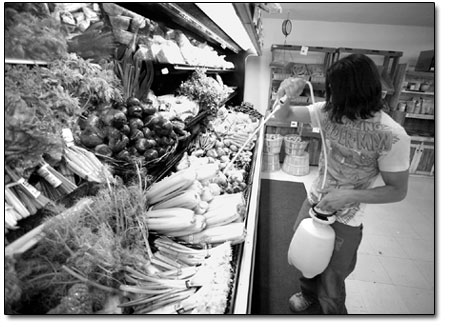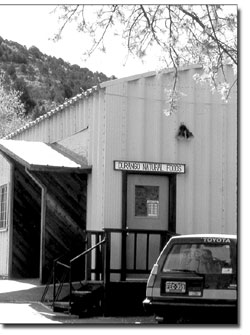|
| ||||
| A natural milestone
by Missy Votel If Durango Natural Foods was a recipe, it would go a little like this: Take one part bulk flour of your choice (whole wheat, oat, spelt, rice, to name a few), add farm fresh eggs (preferably brown), stir in some creative organic mixings (everything from dried goji berries to kalamata olives), sprinkle with tofu (if that’s your thing). Knead with the hands of hundreds of dedicated volunteers and allow to rise in a sunny location for a few dozen years. Of course, the recipe has been altered over time, with the dough rising quicker in some years than others. But this month, as DNF marks its 35th anniversary, Durango’s only member-owned food co-op is still using much the same recipe – served up with a dollop of satisfaction. “It was a team effort,” said current DNF manager Kelli Reese. “I really credit the community. They supported the store through some difficult times.” When Reese arrived two years ago from Kalispell, Mont., the co-op was in rough financial shape due to an expansion in 2000. “They never really recovered,” she said. “They were budgeting themselves out of business. They weren’t buying enough food to stock the shelves.” Reese said through some basic “Grocery 101” the co-op was able to get back on track, keep the shelves well supplied and update the store’s interior. “We replaced what people called the ‘thrift store feel,’” she said. In addition, DNF listened to its members and expanded its product mix to include more everyday items and lowered prices. “My goal was to be able to do 100 percent of my shopping here every week, and I do,” she said. The changes worked, and in two short years, the co-op’s annual gross revenues went from $1.5 million in 2006 to $2.6 million in 2008. Likewise, membership rose as well, jumping from 1,500 in 2006 to 2,500 today. “When we made the changes, people noticed and spread the word,” said Reese. And word of mouth is precisely how DNF has grown from its humble beginnings as a bulk food buying club started by Judy Gurian in1973. Back then, the club was housed in a 120-square–foot closet at 700 Main Ave., which was rented for $75 a month. The “store” back then consisted of eight large aluminum bulk food bins, a chest freezer and assorted dry goods. It was staffed by volunteers who cashiered using a red tackle box and recorded sales by hand in a ledger. Around the same time, some members traveled to the East Coast where they had visited a food co-op and brought the idea home. In 1974, Durango Natural Foods, Inc. was registered as an official nonprofit with the state of Colorado.
In the fall of that year, Pat Blair replaced Gurian as manager, merging her home-based produce business with DNF. Homebound at the time due to severe rheumatoid arthritis and recent hip surgery, Blair was carried to and from work every day for a year by her husband, Rob. “He would carry me down there, put me on a stool, I would wheel and deal all day, and he would carry me home,” recalled Blair, who worked that first year without pay. Her interest in natural foods was born from a search for treatments for her arthritis, which struck in her late teens. Thanks to tireless research by Rob, they stumbled upon a raw food diet recommended by Rob’s climbing partners. Pat quit the aspirin regimen she was on at the time and began a juice fast. Although the first few days were rough, by the fourth day, the pain had subsided. “It changed my life,” she said. “From there on out, I went to a raw food diet and juice fasts as pain control. My last bout was in 1974 or 75.” Like the Blairs, many other locals at the time were also seeking out natural foods for better health. “That was the only local source of organic food back then,” said BJ Boucher, an early DNF Board member and editor of the now-digitized newsletter, The Garlic Press. “People came from all over the Four Corners to shop there.” The co-op began to grow and in 1975 moved the alleyway at 527½ E. Second Ave, where the Abbey Theatre is now located. With 600 square feet to work with, the co-op added a commercial kitchen and also started selling fresh produce and frozen foods. Local eggs, fruit, vegetables, honey and beef were also added. “The thought was to have everything in one location and not have to drive around on the mesa to all the different farmers,” said Blair. Artist and gallery owner Karyn Gabaldon was the first manager at this alley location, where she was paid $50 a week to bake bread, make granola and run the cash register. “It was the height of the hippy days back then, so at $50 a week, I thought I was doing really well,” she said. As the hippy heydays waned, however, DNF continued to grow, and it became apparent another move was in order. The co-op invested its savings in a duplex rental property, and in 1979, using the real estate as collateral, bought its current home at 575 E. Eighth Ave. “It was an old boat shop,” recalled Boucher. “There was oil all over the floor, and we had to get down and scrub it clean.” Another growth spurt hit again in 1987 when the DNF Board sold the duplex to finance the purchase of a house to the west of the store, which was demolished to make way for the parking lot. “That hole in the parking lot was where the basement of the house used to be,” said Blair. In 1994, DNF celebrated its 20th anniversary with the burning of its mortgage deed, and for a short time, the co-op was debt-free. Alas, growing pains soon called, and in 1999, DNF bought the south adjoining property. The store was now able to double in size and add a fresh-food deli and larger storage space. “DNF grew from a rented ‘closet’ to owning its own expanded building because of committed, loyal members, too numerous to name,” said Blair. “It just goes to show, if you beat your drum, and your vision is clear, people will come.” And such support is something Reese is hopeful will continue. Integral to this is the showcasing of local food and products, she said. “For me, that’s the whole reason we’re here, to build a sustainable community,” she said. “Very rarely do we say we can’t sell something local. If we have the room, we’ll sell it.” To further push local products, Reese said the store offers free samples, discounted prices and highlights the items online. The co-op is also working harder to help its members as well, such as with the recent 10 percent off day. “People were really thankful,” she said. “It was a huge success. We even had people coming down from Silverton and stocking up.” Reese said the co-op plans to offer more 10 percent off days as well as classes, a community garden and an expanded outdoor eating area. However, she noted that what ultimately happens at the co-op is up to its members. And with the co-op on stable ground for the first time in years, she said there is no time like the present to let the ideas fly. “There hasn’t really been a time when we weren’t in crisis mode,” she said. “And all of a sudden, we’re saying ‘Wow. We have a foundation. Where do we want to go from here?’” •
|
In this week's issue...
- May 15, 2025
- End of the trail
Despite tariff pause, Colorado bike company can’t hang on through supply chain chaos
- May 8, 2025
- Shared pain
Dismal trend highlights need to cut usage in Upper Basin, too
- April 24, 2025
- A tale of two bills
Nuclear gets all the hype, but optimizing infrastructure will have bigger impact



